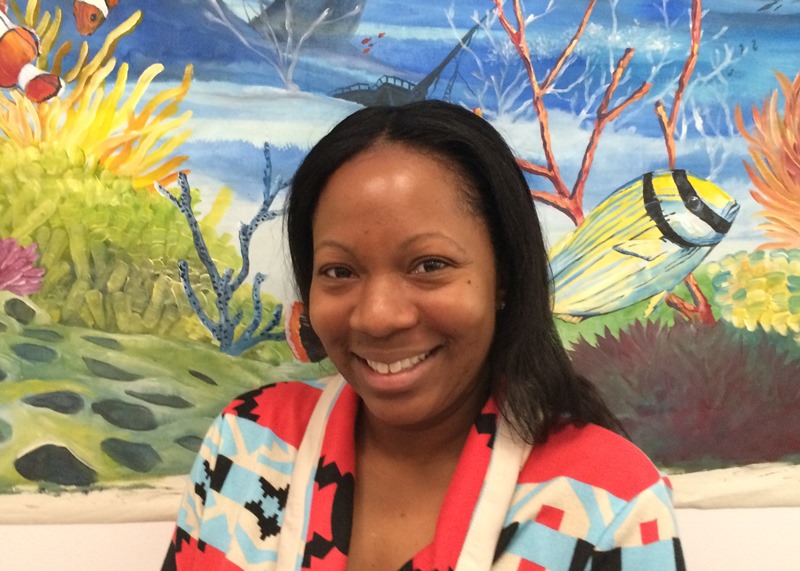There are more than 600,000 social workers in communities across the nation, 5 percent of whom work within our public school systems. School social workers are critical to ensuring that our children reach their full academic and personal potential.
In celebration of Social Work Month, ACPS is shining a light on Karima Wade, the school social worker at Jefferson-Houston School, whose job it is to improve the social and psychological functioning of children.
A child of an educator and a community activist who was passionate about increasing voter registration and affordable housing in low-income communities, Karima says that being a school social worker is in her blood.
Wade spent seven years as a middle school social worker in Boston Public Schools. While visiting her sister in D.C., she met her future husband and father to her now six year old son. The long-distance relationship eventually led to her to move to the Washington, D.C. area, where she spent four years in D.C. Public Schools working with sixth to twelfth-grade students. She joined Jefferson-Houston School in 2011, where she works with students from kindergarten through eighth grade.
It’s middle school students that make her tick. She loves working with students during their adolescent years – a time that most of us would consider the most difficult.
This is a period of self-discovery — often a very challenging time for students because of the wide range of emotions they experience. It’s also a time when bullying and other social issues emerge. This is only made more complex by the advent of social media and mobile technology.
“Kids today are bolder in their choices because they can hide behind social media. They sometimes do things they might not typically do because they can be anonymous,” said Wade.
Building relationships with her students and their families and creating a safe and trusted space where they can talk about whatever challenge they may be facing is a big part of her work.
Wade starts her day greeting students and teachers as they enter the building. She takes advantage of this opportunity to take the pulse of the kids and create touch points with students, whether a high five, a hug, or a simple “hello.” She ensures that her interactions with students are purposeful and caring.
“It’s important for their initial connection with school to be a positive one. Kids will hear a message if it’s coming from a place of caring and respect, even if they don’t like the content of the message,” she said.
On a typical day, in addition to tracking student attendance, which involves making calls home to check on students who are not in school, conducting home visits and offering assistance when a student has been absent for a couple of days, Wade lends assistance to teachers and classrooms in need of support or to students who have been pulled out and may be having a hard time.
Wade, who obtained a bachelor’s degree in psychology from Hampton University and master’s degree from Simmons College in social work with a special certification in urban leadership, is the only school social worker at Jefferson-Houston. She engages in monthly collaboration opportunities with the other social workers in ACPS.
When siblings are involved, she teams up with the social workers at the schools attended by the siblings so that they can develop a holistic and cohesive support system for the family. She also works closely with the school’s psychologist, counselor and nurse to address the concerns of high-needs students and those receiving services. Wade also facilitates a self-esteem group for girls and an emotion regulation group for boys.
One of the challenges Wade faces is getting parents more involved. She wants parents to feel that they have a role at school and in their child’s education. Sometimes parents associate social workers with Child Protective Services and are reluctant to engage, so she focuses on building relationship with families so that they come to see her as a support and a resource.
One of the ways she encourages parents to become more involved is through a book club or assisting in the library.
“When parents know that they can call me at any time to address any issue they are facing, and when they are more engaged, they are more likely to send their kids to school knowing they are in good hands. To be successful as a school social worker you need to be a really strong advocate and have a strong voice because a social worker is often the voice for children and families that may not have a voice, or may not have a strong voice,” said Wade.
Adaptability and flexibility are also key.
“I may have a plan for an activity, but I need to be able to work with kids where they are and based on what they need in the moment. You have to be able to put your plans aside and work with what they bring you. You sometimes don’t know what you are going to encounter, so you have to be ready for anything. The most joyful part of my day is the morning and greeting the kids. I love seeing their excitement to be here. I like to feed that excitement. I really love what I do. I love the kids. It makes me feel good every day knowing that that I’m having a positive impact on the kids,” said Wade.
Learn more about school social workers in ACPS. Be sure to thank your school social worker today!

